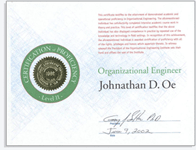Knowledge you can build upon
Introduction to Certification

I OptŪ and Organizational Engineering technology do not require certification prior to use. Many professionals seek certification after they have had some experience with the tools. The typical reason is to get a full command of who, what, when, where, why and how of the technology prior to use at high levels or in particularly sensistive assignments.
Certification of Proficiency
The Organizational Engineering Institute Inc offers a Certification of Proficiency in Organizational Engineering. The Institute periodically offers formal training through seminars conducted in Ann Arbor, Michigan, USA. The Institute also authorizes certain external agencies to conduct seminars that the Institute recognizes as satisfying the educational requirements of certification.
Certification in Organizational Engineering does not center on the interpretation of the instrument itself as is typical of psychological tests. Rather, it focuses on the interaction of multiple people within groups sharing a common purpose and common destiny. The complexity of this area of interest makes the subject more demanding and its impact more profound than is typical of most intervention techniques.
The nature of Organizational Engineering compels certification to follow the medical rather than academic model. All forms of certification require formal training. Higher levels of certification are only obtainable by applying the technology in field settings. Certification levels describe the actual skills a person is likely to bring to bear in field settings. It is a measure of the confidence a client or executive can reasonably expect to be applied in his or her area of interest. Certification divides into levels to indicate degrees of proficiency in Organizational Engineering.
Certification Levels
Foundation Level:
Foundation level certification declares that the individual has successfully completed a one-day seminar in Organizational Engineering conducted by a Certified Organizational Engineer. The individual understands the concepts sufficiently to apply the technology in local settings.
Level I:
Level I certification demonstrates successful seminar attendance and limited application of the technology in the field. The individual has a recognized a degree of competence that can be relied upon to address most issues and situations of limited dimension.
Level II:
Level II certification testifies to successful completion of the seminar and multiple applications of the technology in field settings. The individual has navigated a variety of field situations and has a demonstrated competence in conducting larger scale applications.
Level III:
Level III certification attests to completion of the educational requirement, repeated applications in field settings and use of the technology at the highest organizational levels—at a minimum of a Vice Presidential echelon. Individuals carrying Level III designation can be expected to contribute to policy and strategy as well as operational effectiveness.
Contributor:
Contributor certification appends to any of the above levels of certification. It is recognition provided to Certified practitioners who extend the state of knowledge by publication in recognized journals and professional publications. Clients and executives may look on this designation as evidence of the level of insight the person might be expected to display when confronting novel or complicated situations.
Inactive:
Certified status requires that the individual practice the discipline on an ongoing basis as testified to by citation of specific application(s). Personal circumstances (e.g., a change of jobs, client assignments, etc.) can cause a person to withdraw from active participation. If this period extends beyond 2 years, an "inactive" status is appended to certification. This alerts a client or retaining executive to the skills may be a bit "rusty".